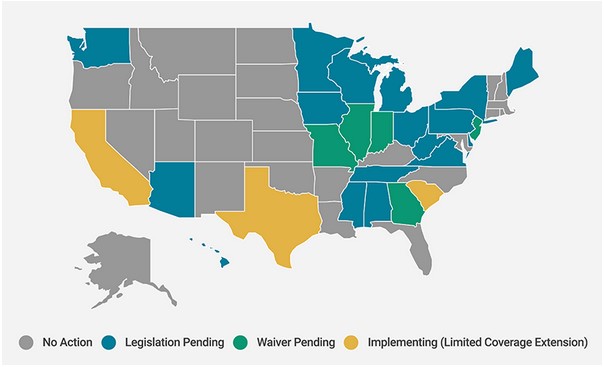CDC: 80% of Pregnancy Deaths Are Preventable
More than four out of five pregnancy-related deaths could have been avoided, according to a new report from the Centers for Disease Control and Prevention (CDC). Highlighting the role of health disparities, the report found non-Hispanic Black mothers were three times more likely to die than white mothers, and that 93% of deaths among American Indian and Alaska Native mothers were preventable. The CDC also found that nearly 25% of deaths were due to mental health conditions, 14% due to hemorrhage and 13% due to heart problems. The remaining deaths were caused by cardiomyopathy, embolism, infection, and hypertension.
FDA Clears Millions of Moderna Booster Doses
The Food and Drug Administration (FDA) gave the green light for a vaccine packaging plant in Indiana to release millions of Moderna’s bivalent booster doses after initially withholding the doses from being released over concerns that the packaging plant was not sufficiently sterile. Since the new bivalent booster doses were made available after Labor Day, state and local officials nationwide have reported shortages of Moderna doses, prompting many booster-seekers to turn to Pfizer instead. Health officials now expect supply issues related to Moderna’s booster to resolve in about two weeks. According to reports, administration officials have so far avoided publicly commenting on the decision to withhold millions of Moderna boosters over concerns that their comments could undermine vaccine confidence.
USPSTF Recommend All Adults Get Screened for Anxiety
On Tuesday, the US Preventive Services Task Force (USPSTF) issued a draft recommendation calling for all adults under the age of 65 to be screened for anxiety. The panel’s recommendation comes amid a spike in new cases of anxiety and depression during the COVID-19 pandemic. According to data from the CDC, the share of adults ages 18 to 44 who received mental health treatment jumped from 18% in 2019 to 23% in 2021. The panel additionally noted that Black and Hispanic/Latino Americans are more likely to face barriers to receiving mental health care due to high treatment costs and lack of insurance coverage. The USPSTF also looked at the benefits of screening for suicide risk in all adults but did not find enough evidence to justify a recommendation.
Senate Leaders Reach Deal on PDUFA Reauthorization
On Thursday afternoon, Senate leaders struck a deal to reauthorize the Prescription Drug User Fee Act (PDUFA) and ensure the Food and Drug Administration (FDA) can pay staff in charge of reviewing prescription drugs, biologics, and medical devices. According to the Ranking Member of the Senate Health, Education, Labor and Pensions (HELP) Committee Richard Burr (R-NC), his policy rider addressing the baby formula shortage was cut from the bill, making the reauthorization measure “practically clean.” However, it remains unclear if House lawmakers have agreed to the deal. The reauthorization bill is expected to be tied to a continuing resolution that Congress is now expected to take up next week.
ICYMI: Capitol Police Once Again Prevail over Lawmakers on the Gridiron
The Capitol Police defeated members of Congress at the Congressional Football Game on Wednesday night by a score of 19-8. Except for a 2019 matchup, the Capitol Police have consistently defeated the lawmakers since the first game took place in 2004. The matchup will notably be the last for the lawmakers’ co-captain Rep. Rodney Davis (R-IL), who lost a primary race earlier in the summer after his district was combined with another. The game generated over $400,000 for the Capitol Police Memorial Fund, which supports the families of officers who are severely injured or killed in the line of duty.



